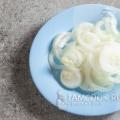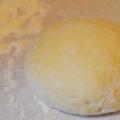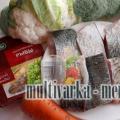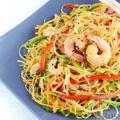Marinated hermelin is a spicy, very fatty, but at the same time delicious cold appetizer of Czech cuisine. Hermelin is a Czech genus of Camembert that gets its name from the white, fluffy shell associated with the snowy fur of the Hermelin ermine.
If you don’t take into account the fact that pickled hermelin is simply very unusual and tasty, the Czechs believe that by pickling it can be stored longer, and thus use excess cheese that they have no desire or opportunity to consume “right now.”
Pickled hermelin is eaten as a snack with beer or with bread - well, like a sandwich. I came across it in Prague in a restaurant as part of a platter of appetizers along with. In my opinion, you can also use it in salads.
For three or four mugs of hermelin (can be replaced with camembert), you will definitely need 1 onion, a couple of bay leaves, a couple of chili peppers or chili flakes. Everything else is optional (I went through quite a lot of Czech recipes, the range of seasonings, except for the three main ones, is huge). This could be peppercorns (green, white or black, or a mixture), paprika, coriander, ginger, just a little vinegar, olives or black olives, some kind of herbs like sage or thyme, a little salt... Another required component - oil, olive or sunflower. A LOT OF. The exact amount depends on the volume of the jar; as a result, the cheese should be completely filled in the jar.
Cut the onion into thin rings, pour in vinegar, and squeeze lightly so that the vinegar is absorbed.

If you have a jar with a neck that is wide enough to fit a whole circle of Hermelin, then cut the cheese in half lengthwise. If you don’t have such a wide-necked jar, you can first cut it in half lengthwise, and then into triangular slices, like a cake. If you definitely want whole circles, but don’t have a jar, then you can take a plastic container of a suitable size.

Peppercorns and coriander are crushed (you can grind them, you can use a mortar).

Place part of the onion on the bottom of a clean jar. If you use triangles, then, in principle, you can put it all in.

Half of the hermelin is placed on top of the onion, cut side up. It is sprinkled with onions and ground seasonings.

We close the first half with the second, well, and then repeat the procedure until the cheese and onions run out: a layer of cheese, onions with seasonings, a layer of onions.

Stuff whole chilies and bay leaves (and other herbs, if using) into a jar and fill the jar completely with oil to cover the cheese.

Close the jar with a lid, shake and leave AT ROOM TEMPERATURE for at least 1 week, up to 2.

After marinating for a week at room temperature, the hermeline can be placed in the refrigerator. It is believed that pickled hermeline can be stored in this way for up to five weeks.

Bon appetit!
Cheese Hermelin refers to soft varieties with the addition of white mold. It is produced in the Czech Republic and in appearance it is very similar to the equally famous cheese - Camembert. High quality cow's milk is used for this cheese. This product is characterized by a fairly dense white crust and a soft milky consistency. There are deep grooves on the surface of the heads that appear during ripening in special containers (see photo). Most often, Hermelin cheese is sold in small heads, weighing approximately 120 g.
Beneficial features
The benefits of Hermelin cheese are the presence of vitamins and minerals. It contains B vitamins, which are necessary for the normal functioning of the nervous system and the functioning of the entire body. It contains vitamin A, which is important for vision, and other substances beneficial to the body. Thanks to the combined action of phosphorus and calcium, bone tissue is restored and strengthened, and they also improve the condition of nails, hair and teeth. It also contains minerals that are necessary for the normal functioning of the cardiovascular system - potassium and magnesium. This is just a small list of useful substances that are needed for life.
Use in cooking
A large number of snacks are made from Hermelin cheese, which are very popular in the Czech Republic. This product goes ideally with good beer and white wine. Czech cheese Hermelin can be consumed fresh, as well as heat-treated. Famous chefs and gourmets say that in order to experience all the aroma and taste, Hermelin cheese must be baked, fried or grilled. This product is also served marinated in olive oil with various spices..
Harm of Hermelina cheese and contraindications
Hermelin cheese can cause harm to people with individual intolerance to the product. It is also worth limiting consumption during weight loss and obesity, as it has a high calorie content.
To prevent flies from getting into glasses, once upon a time in Castilian taverns they began to serve wine covered with a piece of bread. Or maybe the bread did not serve as a lid at all, but was served on purpose so that the soldiers would have a snack and not get too drunk. Or maybe the Aesculapians advised Alfonso X the Wise to overeat less at night, and he ordered only snacks to be served with wine.
When and how the theme of small tapas appeared in Castile, no one can now say for sure, but the Castilians consider themselves its pioneers.
It doesn’t matter whether this is true or not, but the inhabitants of the Iberian Peninsula honor their tradition and it brings considerable income to today’s Spain.
Tapas appetizers paired with fine southern wines are how the cunning Spaniards lure millions of gourmets from all over the world.
Conscientiously developing their “snack bar” theme, which also has hundreds of years behind it, the Czechs are similarly luring millions of beer lovers.
For some time now, marinated Hermelín cheese has become very popular among beer experts. This Czech cheese is similar to the French camembert. Having brought it from the store, the Czechs continue to conjure it for a long time, developing new and new formulas for the taste contrast between cheese snacks and beer. The essence of this “alchemy” comes down to marinating ripening cheese and experimenting with adding different seasonings and spices.
So. Czech cuisine. Cheese pickling recipehermelin.
What to stock up on:
- 3 – 4 cheese pucks,
- 1 – 2 large onions,
- 1 – 2 pieces of chili pepper,
- 1 teaspoon ground sweet paprika,
- 2 bay leaves,
- 15 – 20 grains of black pepper,
- 4 – 5 grains of Jamaican pepper,
- 1 teaspoon mustard seeds.
- 4 garlic cloves,
- Sunflower oil, salt.

What to do:
- Grate the garlic on a fine grater, and then mix the resulting garlic pulp with salt and ground paprika.
- Cut each cheese “puck” along the equator and spread the resulting halves from the inside with the contents of the previous point, after which the cheese halves are assembled back into the “pucks”.
- Now place our “washers”, bay leaves, black and Jamaican peppers, mustard seeds, chili peppers cut into rings and thin onion slices into a specially prepared container. The resulting mixture should be generously poured with oil and, tightly closed with a lid, left in the refrigerator for a week.
- When it comes to the meal a week later, the first glass of real Czech beer should be drunk slowly and without anything, but for the second this very snack will come in very handy.
- Fry slices of black bread in oil saturated with a bouquet of spices.

Paprika after grinding turns out to have a very concentrated taste, sweet with a hint of spice, deep carmine color and very aromatic with a “smoke”.
All these advantages allow you to turn any dish into a work of culinary art. 
At first, this smoke seemed too rich to me and I only added it to meat, then I noticed that when cooked, the taste gradually goes away, leaving a hint of smokedness. Then she became bolder and began adding it to stews, soups, scrambled eggs, and even sprinkled it on ice cream. Nowhere was the seasoning unnecessary and did not interrupt the taste of the dishes.
Well, where I especially love adding it is in marinades. The ribs turn out great!
Oh, sorry, if you have been on a diet since September and are reading all this, for you I have a simple and tasty recipe for a Czech marinated assortment of cheeses, where paprika opened up for me in one more way.
We spotted this dish in Prague, a very tasty appetizer to go with wine. The idea is that the cheeses are marinated in oil, which has drawn out all the flavors from the herbs and spices.
We need cheeses, 200g each:
- Camembert or Brie
- Suluguni or Adyghe
- Dor blue
- Parmesan
- Brynza
- Sheep cheese (very tart, so optional)
- Rosemary a couple of branches
- Thyme, also several branches
- Garlic 5-6 cloves
- Smoked paprika 1/2-1/4 tsp.
- Mustard seed
- Chilli
- Black, red, and white pepper
- Onion a couple of circles (not rings)
- Olive oil, not necessarily Extra Virgin
- No salt is needed here, but you can add it to taste

I poured half a teaspoon of smoked paprika into one jar, and decided to leave the other only with herbs. Everything stood for about a month. The herbal cheese seemed to me delicate, Provençal, the herbs and garlic were felt most of all, but there was not enough spice. I liked the cheese with paprika more, it was softer in consistency and the spiciness was very much in line with the theme, with a slight hint of smoking. In short, the jar of herbs went to the far shelf of the refrigerator, and when I took it out after 2 weeks, I noticed mold emerging, not that noble blue one, but noble, ordinary mold. While the jar of paprika was without mold. It turns out that smokey paprika is also a kind of preservative. I use this feature when drying tomatoes; usually sun-dried tomatoes are stored in the refrigerator for no more than a month.
The marinade oil that remains from the cheese is more valuable to me than extravergen. Very aromatic, tasty, with a cheesy sediment. I like to eat just boiled spaghetti with it!
Expand your taste boundaries!
First, the cheese will need to be cut into neat, beautiful cubes. Chop the dill finely and mix it with the cheese cubes. Peel and cut white and red onions into thin half rings, scald with boiling water to remove the bitterness.

Pour the onion with a marinade from a glass of cold water, vinegar, freshly squeezed lemon juice and granulated sugar, and this marinade must first stand for 15-20 minutes on the kitchen table.

Pour olive oil over the olives, peppers and all the spices and leave to steep for about 30 minutes. Then carefully remove the olives with a teaspoon.

Drain the marinade from the onions and mix the onion half rings with cheese and dill, as well as olives in a deep bowl.

And then put it all in sterilized glass jars. And pour olive oil with spices, adding a small bay leaf to each jar. Seal the jars and let them stand for at least 3, and preferably 7 days.

And a great appetizer for light beer or dry white wine is ready. Serve with cherry tomatoes and fresh lemon wedges.






